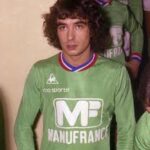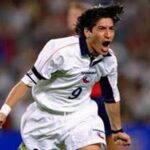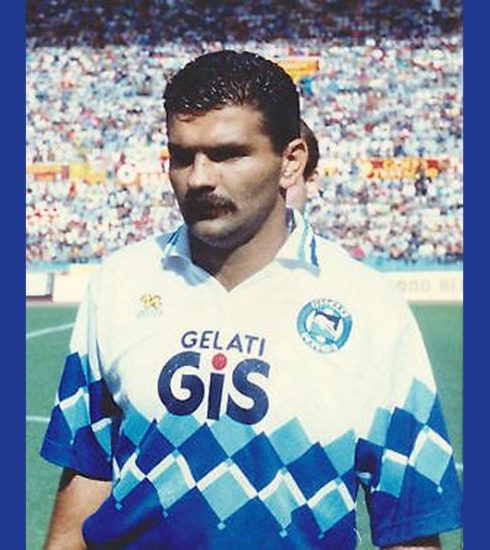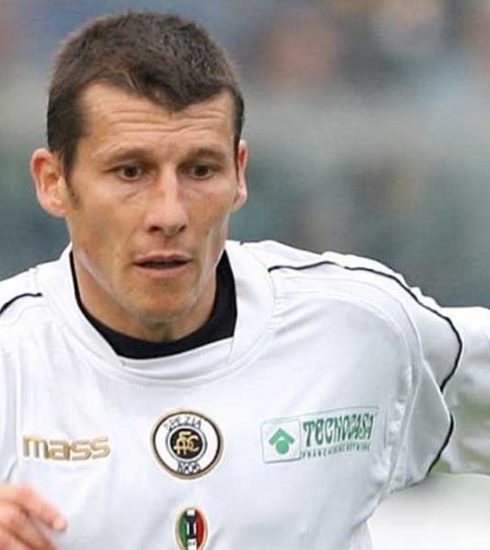IVAN ZAMORANO: The hero of two worlds



“I wasn’t there two years ago in Tenerife.
I was there last year though.
And it hurts like hell even now.
They say that lightning never strikes twice in the same place.
But at Real Madrid, and to several of my teammates today, it did.
Two years ago they felt the title of Spanish champions was firmly in their grasp.
We were ahead two goals to nil with little more than a half to play.
When they scored a goal a few seconds before going into the locker room it seemed like just a minor incident.
Instead in the second half everything that could go wrong did.
First the expulsion of Villaroya and then an unfortunate own goal by Ricardo Rocha and then a crazy play by Sanchis, one of the strongest defenders in Europe, which gave Pier and Tenerife the winning goal and Barcelona the title that my teammates less than an hour before felt was already in their pockets.
Last year when the calendar put us back in front of Tenerife on the last day we were even happy!
This time I was there too.
My teammates’ thirst for revenge was so great … and nobody thought it could happen again.
Instead we went to Tenerife in the exact same situation as the previous season.
We arrived at the Heliodoro Rodriguez Lopez with one point ahead of Barcelona.
This time we knew it would be much tougher.
Valdano and Cappa’s Tenerife had become a great team.
Players worth Castillo, Pizzi, Dertycia and Redondo.
And above all, they were fighting for a top 6 finish that meant qualification for the UEFA Cup, for the first time in the club’s history.
It was, if possible, even worse.
We lost two-nil and were never really in the game.
After about ten minutes we were already one goal down.
When the second one came, towards the end of the first half, we knew it was going to be another terribly bad day.
I could have scored a hat-trick that day but it was one of the blackest days of my entire career. First I was able to miss two goals alone in front of the opponent’s goalkeeper Augustin, who then knocked me down when I had already beaten him and was about to put the ball into the unguarded goal.
The only one who did not see that sacrosanct penalty was the very one who should have seen it …
To top it all off, I also lost control of my nerves, reacting stupidly to a hold by one of their defenders and was sent off.
Once again our great rivals Barcelona overtook us right on the finish line.
Almost two years have passed since that day.
Today at the Santiago Bernabeu comes Deportivo La Coruna. They are our rivals for the title. It is the third last game of the season but winning today would mean getting our hands on the title, this time without any last-day surprises.
We are as tense as the strings of a violin.
We trained hard during the week as usual.
Jorge Valdano, our new coach, (yes, the one who used to coach Tenerife!) has tried in every way to give us serenity, to instil confidence and self-esteem.
But the fear of failing again is just too great.
Not to win tonight (or even to lose …) would be to return to a crazy pressure that is not easy to handle in a great club like Real Madrid, which has not won the title for exactly a five-year period.
My great friend Amavisca is not in the mood for jokes either.
And for someone like him, who is unrivalled when it comes to laughing, making up jokes or messing around, it is really something rare!”
It will be a memorable evening for Real Madrid and for Zamorano.
And it will certainly not be an evening for Merengues fans with coronary problems.
After José Emilio Amavisca had scored the winning goal, with an assist from Fernando Redondo, and after having failed on several occasions to double the score, halfway through the second half, the cold shower arrived, and with it all the ghosts of the last few agonising seasons.
Bebeto, the very strong Brazilian centre forward who had won the World Cup a year earlier with his national team, found the equalising goal with a precise diagonal run.
Depor clearly felt Real’s fear and became masters of the pitch.
They realised that they could win the match and reopen a La Liga that seemed to have been secured by Jorge Valdano’s men.
Fran, Depor’s outside forward, arrives almost at the back and tries to put a cross into the box where at least three white-ball players are waiting for the ball.
Five minutes to go.
His cross is intercepted by Chendo who passes to Redondo.
Real’s ‘5’ passed to Dane Laudrup, who managed to avoid Alfredo’s anticipation and open up on the left for Amavisca. When Real’s outside forward received the ball he was still in his own half. He runs a few metres, raises his head and completely changes play on the opposite side.
In attack for Real, there was only Ivan Zamorano, no less than 25 metres from the opponent’s goal.
The Serb Miroslav Dukic jumps to anticipate the Chilean, but he rises into the air, controls a seemingly impossible ball with his chest. He waits for a rebound and then unloads a diagonal shot that literally folds the hands of Liano, the Depor ‘guardameta’.
The Bernabeu explodes.
Zamorano takes off his shirt and his mad dash ends up on the touchline, the one under the main stand.
He kneels down and is overwhelmed by the embrace of his teammates.
It is his 28th goal in La Liga.
The nightmare is over.
Real is back on the roof of Spain.
Ivan Zamorano was born in Santiago on 18 January 1967 and was the only son of Luis Zamorano and Alicia Zamora. When he was only three years old, he moved to Vila Mexico, in the municipality of Maipu.
When Ivan is only 13 years old, his father Luis dies suddenly of fulminating appendicitis.
Ivan is very close to his father, who passed on to him his passion for futbol. These are difficult years for Ivan, who finds the strength to overcome this trauma in football and in the comfort of his mother.
His first professional contract came in 1985 with Cobresal, a first division team from the city of El Salvador.
El Salvador is a stone’s throw from the Atacama Desert, where the country’s main copper mines are located. It is not an easy place to live but a very close bond is formed between the team and the community.
Ivan soon showed off his great skills, but the team’s coach, Manuel Rodriguez Araneda, felt that the boy needed to ‘cut his teeth’ elsewhere, to find more space among the starting eleven. So he was loaned out to Cobreandino in the Second Division.
Here Ivan literally explodes.
He scores and scores and shows a combative and never tame character that makes him face the tough defenders of that category without any fear.
The Cobresal management did not forgive Coach Araneda for his choice.
Zamorano was recalled to Cobresal where Araneda immediately made amends by handing Ivan the team’s number 9 jersey.
Zamorano’s response was peremptory: 13 goals in the 1987 Apertura tournament and the title of top scorer.
In the same year Ivan made his debut in the national team (scoring against Peru) but when there was already talk of him being transferred to some important club in South America, it was Bologna who, in addition to Zamorano, invested in compatriot Hugo Rubio, decidedly more experienced than Ivan.
Gigi Maifredi, the coach of the Rossoblù, does not consider Ivan Zamorano ready for the Italian championship. The choice is to send him on loan to St. Gallen, in the Swiss top division.
The same thing happened as a few years earlier in Chile with Cobresal.
At St. Gallen Zamorano will prove how wrong Mister Maifredi’s assessment was… with one difference though: this time it will be Zamorano who will refuse to return to Bologna, preferring to play another season at St. Gallen first.
He would score 37 goals in 61 official matches in the Swiss team and at this point the Spanish team Sevilla would come forward.
St. Gallen will collect a record sum for this small club of $2.5 million and Ivan will join one of the most important teams in La Liga.
At Sevilla, injuries will condition his performance to a large extent, but his quality will certainly not go unnoticed.
But the call from the great Real Madrid surprised all observers … and Zamorano himself, who initially did not want to believe that one of the most important clubs on the planet could demand his services.
On 14 June 1992, Ivan Zamorano was presented as the Merengues’ new signing.
His task is by no means easy: he has to replace an absolute icon like Hugo Sanchez, who makes his return to Mexico that same summer.
Zamorano fully recovered his physical condition and played an extraordinary season.
He scored 27 goals to finish second in the La Liga scorers’ table just one goal behind Brazilian Bebeto, winning the Copa del Rey but unexpectedly losing the title on the final day in the away match at Tenerife.
The following season was disappointing, however, for the club (only a 4th place finish in La Liga) and for Zamorano, who only scored 11 goals in the league.
At the beginning of the following season, Jorge Valdano arrived on the bench of the Bernabeu ‘whites’ and told the Chilean bomber that he was not part of his plans for the new season.
Zamorano has opposite intentions.
He is perfectly happy at Real Madrid and has no intention of moving elsewhere, and despite some initial ‘disagreements’, he convinces Valdano of his qualities.
It will probably be the best season in the career of ‘Bam Bam’ Zamorano, who will win La Liga and triumph in the ‘Pichichi’ standings, scoring a staggering 28 goals.
The following season, however, will be one of the most troubled in Real Madrid’s recent history. Problems at all levels, from the Presidency to the pitch where the ‘Merengues’ will end the season with a disappointing sixth place. Ivan will be involved in the club’s bad season even though, unlike several of his teammates, he will often be the last to give up on the pitch.
At this point it was the mighty Inter Milan who shelled out over 4 billion old lire to secure the services of the 29-year-old Chilean.
Two Uefa Cup finals arrived (with Zamorano in goal on both occasions) with the triumph in the second one in the final against Lazio.
Especially from this season, Zamorano’s role in the team changed radically. The arrival of Brazilian ‘Fenomeno’ Ronaldo forces Zamorano into a different job to the one he was used to. He is no longer the terminal of the team’s offensive play but is transformed into the classic ‘wingman’, moving across the entire attacking front, almost always playing as a flanker and trying to create space for his team-mate’s impressive sprinting.
Zamorano immediately adapted to this new role, entering by force into the hearts of the Nerazzurri fans, who appreciated his great contribution to the team.
Meanwhile, with his own national team, great satisfaction is coming.
With the advent of Marcelo Salas, Chile found themselves a pair of strikers of absolute value and with them qualification for the World Cup in France was achieved after 16 years of absence.
“Bam Bam” is decisive.
He scored 12 goals during the qualifying round, setting a still unbeaten record.
It was a good World Cup for Chile, which ended in the round of 16 after a defeat to Brazil.
At the end of 2000, his Italian adventure with the Nerazzurri came to an end.
But the challenges are far from over for the 33-year-old Zamorano.
He moved to Mexico, to Club America, the most popular and followed in the country of the Aztecs.
The expectation is enormous.
And as usual ‘Bam Bam’ Zamorano does not fail to live up to expectations.
He even scores a hat-trick.
The “Aguilas” have a new idol.
The Chilean striker played two seasons at the highest level with the prestigious Mexican club, winning the title in the summer of 2002, thirteen years after his last triumph.
A 3-0 victory in a packed Azteca stadium, overturning the 0-2 first leg with Zamorano, needless to say, the protagonist of the match with the second goal that took the team into extra time where the third goal from Argentine Hugo Castillo was decisive.
In Mexico Zamorano is an absolute reference for the team and an icon for the ‘Hinchada’ of the ‘Aguilas’ but there is a promise to keep.
The one made at his sick father’s bedside: to one day play for Colo Colo, the team of Luis’s heart and also of his son Ivan.
‘Bam-Bam’ returns to Chile for one last season with football boots on his feet.
He will play in the 2003 Apertura tournament, scoring eight goals in 14 matches and helping to drag Colo Colo to the final against Cobreloa, lost badly by 4 goals to 0.
At the end of this match, Ivan Zamorano announced his farewell at the age of 36 to devote himself to his business activities where he demonstrated the same skill he had on the pitch.

ANECDOTES AND CURIOSITIES
One of the most curious anecdotes is the one told by Chilean coach Manuel Pellegrini.
“We were playing a match in the Chilean Cup. I played defender for Universidad de Chile. Against us was a Second Division team, Cobreandino.
On a shot from outside, our goalkeeper rejected the shot. I jumped to head the ball away when behind me came a 17-year-old boy who jumped half a metre higher than me and headed the ball into the net. That very day I decided it was time to quit football’.
That boy was, of course, Ivan Zamorano.
Pellegrini’s afterword, however, is beautiful. ‘Well, if I had known what Zamorano would become I would have happily played a couple more years!’
In the summer of 1994, Jorge Valdano arrived on the Real Madrid bench. In his football proposal there is no place for Ivan Zamorano. He communicates this to the Chilean, inviting him to look for a team.
Ivan, however, has no intention of giving up easily.
During one of the first training sessions with the team, during a match the two face each other to compete for the classic ’50/50′ ball.
Zamorano enters with great decision, literally sending the former Argentine world champion sprawling.
Valdano gets up and with his usual phlegm asks Zamorano “Do you always train with this grit or only when you can’t stand your coach?”.
Zamorano plays an excellent ‘pre-temporada’ and eventually convinces Valdano (a person of great culture and intelligence) to confirm him as number 9 in Real Madrid’s attack.
There is one match that counts more than any other for Real Madrid: and that is, as everyone knows, the ‘Clasico’ against historical rivals Barcelona. Scoring against Barcelona for a Real Madrid striker means guaranteeing unconditional love and a lot of extra patience in case of unexceptional performances.
Ivan Zamorano had already managed it in his first two seasons, often with the ‘mark’ of the house, that is to say, with terrible ‘zuccate’.
In the 1994-1995 season, however, he even scored a hat-trick in front of the Bernabeu crowd, which tasted even sweeter because it contributed to the ‘manita’ (5 goals to 0) that Real beat the Blaugrana, who had done the same in the opposite direction only a year before.
The most clamorous thing is perhaps the fact that of Zamorano’s three goals, not a single one was a header!
Many, however, remember what happened with Ronaldo’s arrival at Inter. With the important ‘pressure’ of Nike, sponsor of the Nerazzurri club and Ronaldo himself, Zamorano was forced to give up the number 9 shirt worn in the previous season where the Brazilian phenomenon had to ‘settle’ for number 10. In the 1998-1999 season, with the arrival of Baggio who was assigned the number 10, Zamorano, certainly not happy about this, found himself having to choose a new shirt number.
A contrivance arrived.
It seems that the idea is President Moratti’s own.
Zamorano will take the field not with the number 18 he was assigned but with the number 1+8 … confirming that he is still to all intents and purposes a centre forward.






